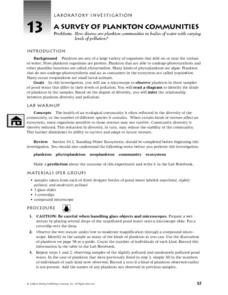Curated OER
Maintaining the Natural Balance
In this pollution instructional activity, learners will identify the sources of air, water, and land pollution. Then the students will list some of the problems caused by these types of pollutions in 3 short answer questions.
Curated OER
Clean Air: Our Health Matters
Students learn about the human respiratory system. In this pollution lesson, students identify the parts of the respiratory system and what happens to them when they breathe in polluted air. Students learn about the importance of...
Curated OER
A Survey of Plankton Communities
In this biology worksheet, students identify and define the vocabulary terms listed and make a prediction about the outcomes of the experiment. Then they complete the chart of the observations of the plankton diversity in drops of pond...
Curated OER
Cave Diagram
Students examine limestone cave geology and hydology. They study cave vocabulary.
Curated OER
Environment: Just Around the Bend
Students decipher landforms on a map and corresponding satellite imagery. They consider the impact of pollution on agriculture and water. They draw diagrams demonstrating how pollution works its way into the food source.
Colorado State University
What Is a "Model"?
Model the transfer of energy during a typical 24-hour period. Young scholars use a game-like approach to learning the patterns of heat transfer through the day and night. Groups of four exchange different tokens as the energy transfers...
Curated OER
Wet 'n Wild Watershed
Students engage in a discussion on watershed management. In this ecology lesson, students consider the role of forests in water quality. Students incorporate lecture material into a class room discussion and questions on water shed...
Curated OER
Earth: Our Big Blue Marble
Students investigate Earth and its resources. In this Earth, space, and nature lesson plan, students collaborate to design presentations on the Earth, its cycles, and how humans have impacted the planet. Images, diagrams, and background...
Curated OER
Geography Action! Rivers 2001- Human River
Students create a 'human river' by arranging themselves into a river pattern. Each student selects an article to represent a pollutant such as paper, book, or pencil. Students at the source of the river pass their pollutant on to the...
Curated OER
Not a Drop to Drink
Students explore potential issues of a water shortage. In this water conservation lesson plan, students brainstorm the many uses of water and what life would be like if there was not enough water available.
Curated OER
Sectors? What Sectors?
Learners develop a list why water is an endangered natural resource. They identify four sectors in society. They explain the responsibilities that each sector plays in conserving water.
Curated OER
Language Arts: How Can Research Shape Ideas?
Learners are able to characterize arsenic and determine its potential health threats in writing. They are able to compare and contrast arsenic to other water pollutants using Venn diagrams. Students are able to demonstrate essay skills...
Curated OER
NCTA Lesson Plan on China
Students identify China's geography, especially arable land, rainfall, crop growing areas, rivers, and mountains. Students select a technological advance to draw a diagram of the particular advance make transparencies of the diagram,...
Curated OER
Making Recycled Paper
Learners explore the advantages of recycling paper. In this environmental instructional activity, students produce recycled paper by ripping up paper and putting it into a blender with water to create a mixture. Learners use their...
Curated OER
Weathering and Soil Formation
A set of 27 slides systematically shows how weathering, erosion, and deposition contribute to soil formation. Both chemical and mechanical weathering are described, as are resulting soil layers and properties. There is no longer any need...
Curated OER
Topics in Environmental Science
Students discover topics in environmental science. In this science lesson plan, students build a model to simulate the greenhouse effect and analyze and interpret data, especially the results of introducing pollutants into nature.
Curated OER
Estuaries, Estuarine Habitats, and Adaptations
Students conduct research on estuaries. They design and construct an estuary, describe the physical characteristics of an estuary, and create a diagram illustrating an estuarine food web.
Carnegie Mellon University
Hydroelectricity
Use a simple PowerPoint presentation to introduce you environmental studies class to hydropower. Hold a debate about the pros and cons of developing this form of alternative energy. Power up your class with this simple lesson on a topic...
Teach Engineering
Biological Processes: Putting Microbes to Work
Is there such a thing as useful microbes? Get ready to perform experiments on applying microbes for wastewater treatment. The first installment of the three-part unit provides background information to prepare young engineers for two...
Curated OER
Fourth Grade Science
In this science worksheet, 4th graders answer multiple choice questions about coastlines, electric cars, the food chain, and more. Students complete 25 questions.
Bethel School District
Observations and Inference
What's the difference between qualitative and quantitative observations? Learners make observations, inferences, and predictions about their environment with a set of questions and activities that are applicable to either language arts...






















